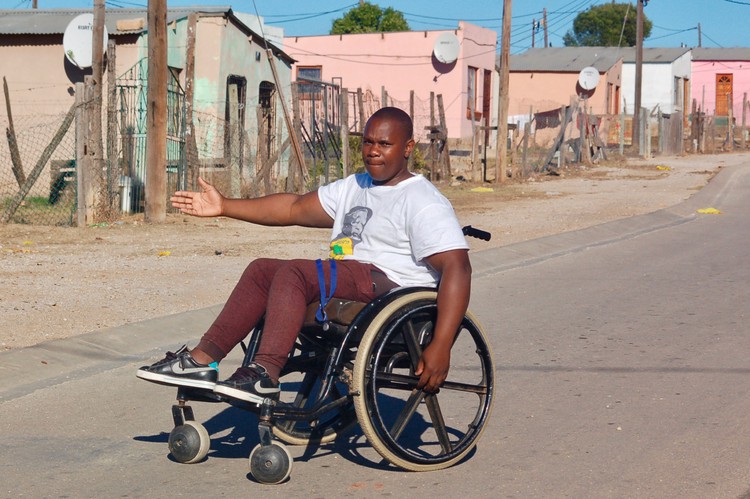RDP houses unfit for people with disabilities
People with disabilities are prioritised for RDP houses but their homes are often not adjusted for them despite mounds of legislation
Living in an RDP house and being disabled is “hell”, complains Zingisani Mhlahlela. He is 30 years old and uses a wheelchair. He lives with his mother in an RDP area of Chris Hani in KwaNobuhle township, Uitenhage.
His RDP house is not adapted for his wheelchair and he struggles to get in and out of his home and also to use the toilet. “When nature calls, the wheelchair itself gets damaged,” he says.
Mthubanzi Mniki, spokesperson for Nelson Mandela Bay Municipality, said, “The priority of housing delivery is to give houses first to disabled and elderly [people]. The houses must be suitable for their needs, accessible and closer to amenities … Due to the pressure of the backlog, people end up occupying houses that are not that suitable to their needs.”
Temba Mzantsi, the secretary of Persons with Disabilities Forum in Nelson Mandela Bay, said the municipality should implement the White Paper on the Rights of Persons with Disabilities (approved by cabinet on 9 December 2015), the Disability Framework for Local Government, the Integrated National Disability Strategy, and the Convention on the Rights of Persons with Disabilities.
“Those are the policies they should refer their heads of department to look at when they are to deliver any services,” said Mzantsi.
Provincial Human Settlements spokesperson Phiwokuhle Soga said, “The Housing Code has provision for variation of the subsidy to allow for the enhancement to the house in order to accommodate specific disabilities, eg a ramp, rails etc.”
But Mhlahlela, who is now in his third year as a marketing student at Eastcape Midlands College, says, “The policies regarding persons in the disability sector are stated in papers, but practically, we are completely excluded.”
He says he has yet to see an RDP house adapted for disability in his area. He knows of only one house, for a blind woman in Chetty, Port Elizabeth. It has a rail which guides her from the gate up to the front door.
“Thumbs up to that! But in my own township, I haven’t seen such a house although there are many blind people living in RDPs.”
“The government also is supposed to install a bell which rings simultaneously with a blue light in deaf people’s RDP homes. The blue light shows that someone is knocking. The specification is there, but the builders just build houses anyway because the government does not give the builders the specifications,” he said.
Mzantsi said, “Some disabled people, including the blind, have applied for their houses more than five years ago. Up until now, they’re living in rented, inadequate houses.”
Mzantsi said the slogan of the disabled is nothing about us without us, “but they build RDPs for us without involving us”.
“We do specify on application forms we fill in and include the doctors medical report … However none of us in the disability sector gets a house that meets our needs from scratch. There are no rails and no ramps in RDP homes being built … Instead, they build houses like everyone else but later change it to meet the standard required, if we put pressure on them … For instance, I can’t enter my own RDP without being lifted off the wheelchair first … Every door inside the house I must access by being lifted first.”
He said some people paid for ramps and rails out of their own pockets.
Correction: The following quotation was incorrectly attributed to Health spokesman Lwandile Sicwetsha instead of Temba Mzansi e: “The municipality should implement the White Paper on the Rights of Persons with Disabilities (approved by cabinet on 9 December 2015), the Disability Framework for Local Government, the Integrated National Disability Strategy, and the Convention on the Rights of Persons with Disabilities.
Support independent journalism
Donate using Payfast

Next: Court orders end to mud schools
Previous: Hundreds share one working toilet in Khayelitsha neighbourhood
© 2018 GroundUp.
This article is licensed under a Creative Commons Attribution-NoDerivatives 4.0 International License.
You may republish this article, so long as you credit the authors and GroundUp, and do not change the text. Please include a link back to the original article.

